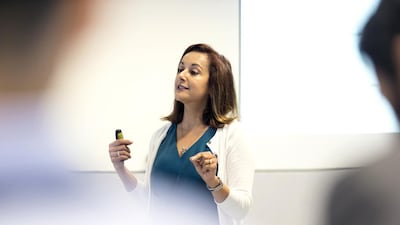The virtual world is increasingly infiltrating our daily lives – be it in maintaining relationships or how businesses connect amid shrunken travel budgets.
But how much of a role can the digital realm have in leadership training, enhancing and preparing future bosses? And, more importantly, can it do so effectively?
These were two of the issues tackled by academic Sona Sherratt and her researchers in the report Developing Global Leaders in a Digital World.
They explored the comparative effect of face-to-face, blended and virtual learning on leadership development.
The results surprised Ms Sherratt, faculty member of Ashridge Executive Education, UK, where she designs, teaches and client directs on several executive education programmes.
“As researchers we walked into this thinking face-to-face will always be better,” she says. “That people’s experiences, their behavioural change, will always be better face-to-face. The surprise is, it has the potential to be just as effective virtually.”
Ms Sherratt recently illustrated this during a roadshow on behalf of Ashridge at Hult Business School’s Internet City campus.
She demonstrated to local HR and business people how effective virtual learning can be, using “critical incidents”. In one case, a volunteer interviewed via video link a “staff member” about work behaviour and absences.
The emotional reactions appeared no less significant than had the actor or interviewee been in the room.
“We are trying to increase heart rate, that potential level of stress, so people have memorable experiences,” says Ms Sherratt, whose report followed earlier research examining learning retention.
“Most managers learn most through having experiences, either on the job or within training and development programmes. We know memory retention is based around having emotional experiences.”
Ms Sherratt, whose clients include Swarovski, Avis and Continental, says statistics suggest 77 per cent of organisations are using some form of virtual learning platform.
Ashridge ran its Leadership Experience programme virtually and got results that surprised but could prove positive for firms seeking to boost leadership skills without losing staff to distant courses.
“Many of us see virtual as a two-dimensional thing; we can walk away from it and won’t feel that same sense of engagement, or interaction, or even responsibility for other people in that group. We found people saying not only did they feel they learnt they also felt that same sense of responsibility towards peers who they’d never met who are virtual within this space. That is a surprise.”
Barry O’Mahony, the dean in the business faculty at University of Wollongong Dubai, says “in certain circumstances and under certain conditions” virtual can be as effective as face-to-face.
“The modern virtual learning environment has improved over the last 10 years. Most important is the pedagogy. “Curricula can be modified for virtual delivery. The development of programmes, however, needs to be very detailed and follow a particular structure to achieve the learning outcomes developed in to support the programme.”
Liri Andersson, the founder of a boutique business and marketing consultancy that enables Fortune 500 organisations to understand, navigate and commercially exploit the changing business and marketing environment, is a guest lecturer at Insead business school, which has a branch in Abu Dhabi.
She sees corporate attitudes towards virtual solutions changing, but some need convincing.
“Leaders in Fortune 500 companies I consult, or teach, show an overwhelming tendency to see virtual as something less than, or not real – yet most have never actually tried the technology,” she says. “Younger generations, with a broader exposure to technology-based solutions, do not make that distinction; to them both virtual and physical are perceived as reality.”
Ms Andersson sees virtual reality playing a larger role in business education.
“At some point physical and virtual worlds will merge, and we will no longer be referring to real, virtual, physical – it will simply be reality,” she says.
“Hence, everything that can be digitised will be digitised – learning, education, and workplace interactions is no exception. We will be able to bring people together from across regions, companies, functions in a blink of an eye to engage, at a fraction of the cost.”
Ms Sherratt says methodology remains key. “There will always be a demand for leadership development,” she says.
One thing the study found, says Ms Sherratt, was that with face to face, people wander in and out. “But people felt reluctant to walk away from a screen,” she says.
business@thenational.ae

